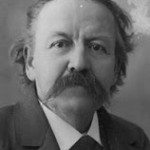0
A Brownwater Sailor’s Legacy
In 1862 young Charles Fosdick locked several special possessions in a trunk before reporting for duty with the Mississippi River Squadron. The trunk remained with family members in western New York; its key went with him.
Fosdick began his naval career as a lowly landsman on a magazine ship but was soon transferred to a commissary vessel. During the Vicksburg campaign, he served aboard a gunboat; later he was a captain’s clerk on a large ironclad ram. He finished his service in Mound City, charged with maintaining the squadron’s coal supply.
Once his duties stationed him in a navy yard, Fosdick sent for his trunk. It arrived intact, and one of the items he removed after unlocking it set him on the course he pursued the rest of his life.

Writing boys adventure stories under the penname Harry Castlemon, Charles Austin Fosdick (1842-1915) was a chief rival of Horatio Alger. His books are available in reprints and online.
A school composition class inspired Fosdick to become a writer of boys’ adventure stories, his favorite genre. Seeking encouragement, he mentioned his desire to his mother, whose response was disparaging rather than supportive. Disappointed but not discouraged, the budding author simply began writing in secret. By the time the Civil War began, Fosdick had drafted a novel about a young naturalist named Fred and revised it several times. His last revision was among the special possessions locked in the trunk.
Fosdick retrieved his manuscript, reread it, and decided his numerous antebellum revisions had produced a novel ready for publication. His letter of inquiry sent to a Cincinnati publishing house netted an encouraging reply: The firm agreed to read the manuscript and provide an opinion of it. The opinion was positive; Frank the Young Naturalist was accepted.
*****
Thus began the career of one of the most prolific and popular authors of boys’ adventure stories in the nineteenth century. Fosdick immediately began turning out more novels, basing them on his wartime experiences. Frank became a sailor in Frank on a Gun-boat and Frank before Vicksburg, both published in 1864, and Fosdick became Harry Castlemon. Why he assumed a penname is unknown, but Fosdick may have wanted to keep a low profile. Since his three-year enlistment ran through the autumn of 1865, much of his writing was likely done on government time.
Out of the navy, Fosdick returned to New York state and continued writing adventure novels for boys. The late nineteenth century was the heyday for this type of literature, and Fosdick was able to support a wife and three children with his pen. His efforts earned him a place in Who’s Who in New York, and the 2005 edition of The Continuum Encyclopedia of American Literature asserts that Fosdick was “probably the most read author for boys in the post-Civil War era.”
From a rented home in Westfield, New York, Fosdick churned out dozens of novels until the beginning of the twentieth century, taking his youthful readers on vicarious adventures in trapping, hunting, camping, fishing, boating, and bicycling, generally via series books. Late in his career, he refocused on the Civil War in a five-volume series featuring cousins Rodney and Marcy, cadets at a South Carolina military academy, who find themselves serving opposite sides during the war.
Fosdick’s target audience for this series had, of course, been born decades after the war’s end. In reviewing its first volume, True to His Colors, in December 1889, The Literary World: A Monthly Review of Current Literature said, “Boys will not only be highly entertained by it, but helped to a knowledge of the condition of things at the breaking out of the rebellion.” This quality is of even greater value to contemporary readers.
Many juvenile adventure stories of the post-Civil War era assumed a heavy-handed moralistic posture, but Fosdick’s books were not preachy. However, The Continuum Encyclopedia of American Literature points out that Fosdick’s fiction “was not without its lessons” as he stressed that success is achieved through hard work and persistence, the very qualities he relied upon as a teenager writing his first book in secret.
Henry Emerson Fosdick, a noted liberal minister of the early twentieth century, was the author’s nephew. In his autobiography, he recalled welcoming each new book by his uncle “as a gift from the gods,” echoing the feelings hundreds of boys held for an author they knew as Harry Castlemon.